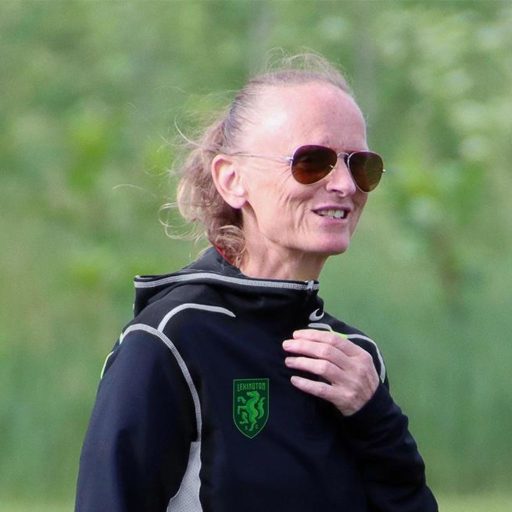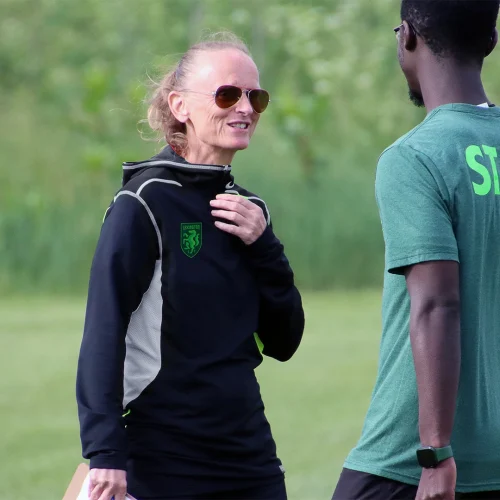As someone who has had the privilege of coaching both college men’s and college women’s soccer teams and currently serves as the Women’s Head Coach and Women’s Sporting Director at Lexington Sporting Club in Lexington, KY, I’ve gained valuable insights into the distinct qualities and skills that female players bring to the field compared to their male counterparts. Coaching in both settings may appear similar on the surface, but some differences warrant a closer examination.
Coaching at the collegiate level for both men and women has allowed me to witness the unique attributes that each gender contributes to the game. In college soccer, there are specific skills and qualities that female players often exhibit, setting them apart from their male counterparts.
One interesting aspect I’ve noticed is that female players often lean towards humility within their teams. Unlike some male athletes who may relish showcasing their individual prowess, female athletes frequently find fulfillment in blending in with the collective effort. They value being part of a unified team. However, it’s important to clarify that this is not a universal trait but rather a trend I’ve encountered frequently.
Female athletes at the collegiate level often have more responsibilities off the soccer pitch compared to their male counterparts. Even in today’s evolving landscape, many female athletes still find themselves balancing their sports careers with “real-life” responsibilities, such as holding down a regular job to make ends meet. While improvements have been made in terms of pay for female athletes, many still need supplemental income to sustain their soccer goals. This skill set extends beyond the soccer field and carries immense value.
In contrast, male athletes at the collegiate level often face fewer off-field obligations, affording them the luxury of focusing more exclusively on their soccer careers. This isn’t to suggest that male athletes lack dedication or a desire for success, but it underscores the differences in how they approach competition and commitment.
Drawing from my experiences coaching male and female college soccer athletes, I’ve found that the desire to excel is universal. Still, the expression of that desire can manifest differently. Male athletes may be more vocal about their individual aspirations, whereas female athletes often channel their ambition into bolstering the team as a whole.
Coaching at the college level requires recognizing and appreciating these distinctions when working with male and female players. For female athletes, fostering their sense of teamwork while simultaneously supporting their individual growth becomes paramount.
However, it’s crucial to address a common misconception: the belief that female players are more ready to accept college-level coaching than their male counterparts due to differences in ego and confidence. This oversimplification doesn’t capture the complexity of coaching dynamics and athlete attitudes.
Firstly, individual variation plays a significant role. Athletes, regardless of gender, come from diverse backgrounds and possess different personalities, attitudes, and levels of coachability. Some individuals are naturally receptive to coaching and value the guidance, while others may initially resist or question it.
Ego and confidence levels can also be a factor in how athletes respond to coaching, but these attributes are not exclusive to any gender. Some male athletes may have high levels of confidence and a willingness to learn, just as some female athletes may display similar characteristics.
Coaching effectiveness often depends on the coach’s communication style, leadership skills, and ability to build rapport with players. Coaches who establish trust and credibility are more likely to have athletes, regardless of gender, accept their guidance.
Team culture and dynamics play a significant role in how athletes respond to coaching. A positive and collaborative team environment can encourage all players to be more receptive to coaching.
Coaching philosophy matters as well. Coaches with a player-centered coaching philosophy tend to have better success in getting athletes to buy into their coaching methods. This approach focuses on the individual development and well-being of each player, fostering a more cooperative atmosphere.
Furthermore, athletes’ goals can vary, and this can influence their willingness to accept coaching. Some players are highly motivated to improve their skills and reach their potential, while others may have different priorities or motivations.
Experience and maturity also play a role. Whether male or female, college freshmen might need more time to adjust to the demands of college-level sports and coaching.
In summary, it’s essential to avoid making sweeping generalizations about how male and female athletes respond to coaching. Coaching effectiveness depends on various factors, including the coach’s approach, team culture, and the individual athlete’s personality and goals. Successful coaches work to build relationships with their athletes, understand their unique needs, and tailor their coaching methods accordingly, regardless of gender.
As we delve deeper into the world of coaching college soccer, it’s vital to explore how these differences can translate to the professional level, especially for female athletes. The collegiate experience serves as a crucial foundation for aspiring professional women’s soccer. The transitirom from college to the pional soccer arena can be particularly challenging. The humility and emphasis on teamwork cultivated in college soccer are assets that can serve female players well in the professional leagues. In a sport where teamwork is fundamental, players who value collective success can become pivotal assets to their professional teams.
The commitment to team success and the ability to excel in multifaceted roles make female players not only exceptional athletes but also well-rounded individuals who can thrive in the professional soccer world.
In conclusion, coaching college men and college women in soccer offers its own unique set of challenges and rewards. The disparities in attributes, motivations, and off-field responsibilities between male and female athletes highlight the necessity for coaches to adapt their coaching methods. Recognizing and valuing the distinctive qualities of female players, including their emphasis on teamwork and exceptional time-management abilities, can lead to more effective coaching. Moreover, it can contribute to the success of both individual athletes and the team as a cohesive unit.




